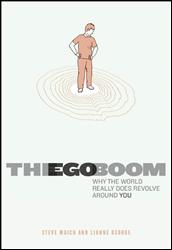
In the book, we've included a whole chapter on how the You Sell is being harnessed by spiritual leaders and spiritual entrepreneurs alike to draw people in. The idea, in its simplest terms, is that today's consumers (of products and ideas) are not responsive to rules and obligations. They're certainly not interested in guilt. Instead, the best way to appeal to would-be adherents is to express to them what your world view can do for them—how they can use your belief system to improve their lives and, most importantly, to self-actualize.
And so it's been fascinating to watch the advertising war unfold between Atheists and Christian groups in the UK (and elsewhere, to a lesser extent).
It began when Atheists in Britain paid to place ads on 800 London buses that read: There is probably no God. Now stop worrying and enjoy your life."
The ads are a clear appeal to the average person's desire for permission and autonomy—the freedom to live the life they want to live, and not to be judged for it. If there is no God, then moral authority rests with each and every one of us. We are the final arbiters of right and wrong. In other words: Relax, you have to justify your choices to yourself and no one else. It's a very seductive message.
Now, the Russian Orthodox Church has issued a retort in the form of a series of bus ads that read: "There is a God. BELIEVE. Don't worry and enjoy your life."
Amazingly, they've made use of the same rhetorical tool—selling the idea of personal freedom. There is a God, they're saying, but he's not there to make your life difficult. He's not there to judge you. He wants you to be relax and enjoy. It's this kind of messaging that Christian marketing consultants say is the best way for churches to reach out to the "unchurched" and try to bring them back into the fold. Tell them: It's not what you can do for the Church, it's what the Church can do for you.

